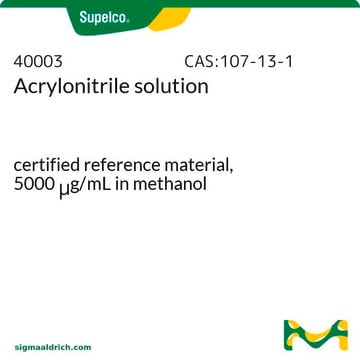8.00834
Acrylonitrile
(stabilised with hydroquinone monomethyl ether) for synthesis
Synonym(s):
Acrylonitrile, Acrylic acid nitrile, Vinyl cyanide
About This Item
Recommended Products
vapor pressure
124 hPa ( 20 °C)
Quality Level
Assay
≥99% (GC)
form
liquid
autoignition temp.
480 °C
potency
78 mg/kg LD50, oral (Rat)
expl. lim.
2.8-28 % (v/v)
pH
6.0-7.5 (20 °C, 50 g/L in H2O)
bp
77.3 °C/1013 hPa
mp
-83.55 °C
transition temp
flash point -4.4 °C
density
0.81 g/cm3 at 20 °C
storage temp.
2-8°C
InChI
1S/C3H3N/c1-2-3-4/h2H,1H2
InChI key
NLHHRLWOUZZQLW-UHFFFAOYSA-N
Application
- Designing amphipathic surfaces: The use of interfacial energy in photopolymerization processes for creating amphipathic surfaces, enhancing applications in coatings and biomedical devices using acrylonitrile polymers (Curley et al., 2024).
- Dental model printing technology: Atwal and Bhatnagar assessed the flexural strength of dental models fabricated using various 3D printing technologies, including those utilizing acrylonitrile-based resins, highlighting differences in mechanical properties (Atwal and Bhatnagar, 2024).
- Rubber composite enhancements: Kruželák et al. examined the electrical conductivity, EMI absorption, and mechanical properties of rubber composites, incorporating acrylonitrile to improve performance in industrial applications (Kruželák et al., 2024).
- Biopolymer blend characterization: Akbarian-Saravi et al. characterized the mechanical and biodegradation properties of NBR/biopolymer blends, with acrylonitrile enhancing the blend′s performance in various industrial and environmental applications (Akbarian-Saravi et al., 2024).
- Electrode/electrolyte interface regulation: Chen et al. discussed constructing polymer molecules to regulate the electrode/electrolyte interface in lithium-metal batteries, utilizing acrylonitrile derivatives to enhance battery performance (Chen et al., 2024).
Analysis Note
Density (d 20 °C/ 4 °C): 0.805 - 0.807
Water (K. F.): ≤ 1.0 %
Identity (IR): passes test
Signal Word
Danger
Hazard Statements
Precautionary Statements
Hazard Classifications
Acute Tox. 3 Dermal - Acute Tox. 3 Inhalation - Acute Tox. 3 Oral - Aquatic Chronic 2 - Carc. 1B - Eye Dam. 1 - Flam. Liq. 2 - Skin Irrit. 2 - Skin Sens. 1B - STOT SE 3
Target Organs
Respiratory system
Storage Class Code
3 - Flammable liquids
WGK
WGK 3
Flash Point(F)
23.0 °F - closed cup
Flash Point(C)
-5 °C - closed cup
Regulatory Listings
Regulatory Listings are mainly provided for chemical products. Only limited information can be provided here for non-chemical products. No entry means none of the components are listed. It is the user’s obligation to ensure the safe and legal use of the product.
EU REACH Annex XVII (Restriction List)
Certificates of Analysis (COA)
Search for Certificates of Analysis (COA) by entering the products Lot/Batch Number. Lot and Batch Numbers can be found on a product’s label following the words ‘Lot’ or ‘Batch’.
Already Own This Product?
Find documentation for the products that you have recently purchased in the Document Library.
Customers Also Viewed
Our team of scientists has experience in all areas of research including Life Science, Material Science, Chemical Synthesis, Chromatography, Analytical and many others.
Contact Technical Service


















